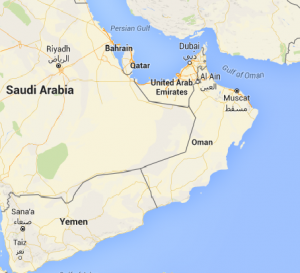Oman is one of the more ancient national entities of the Gulf, with the most stable political regime in the Middle East (measured by the number of years the current sultan has been in power).
In the 17th century, the Omani Sultanate was a powerful empire, competing with Portugal and Great Britain for control of the Persian Gulf and Indian Ocean. At its peak in the 19th century, Omani influence stretched from modern-day Iran to modern-day Tanzania.
In the 20th century, however, the once-powerful Sultanate declined and eventually came under British influence.
During much of the 20th century, there was an internal power struggle in Oman between the ruling Sultanate – the Al Bu Said dynasty – and the Ibadi Imamate. The Ibadiyah religious sect settled in Oman as early as the 800’s and maintained leadership through a succession of imams up until today.
However, the Sultanate was the ruling political entity during much of the nation’s history before the British rule in the early years of the 20th century, when the country was under British influence.
This resulted in a British-brokered deal where the Imamate received some degree of autonomy in the interior of the country, while the Sultanate ruled the coastline. But when British influence eventually subsided towards the 1950’s, clashes resumed.
This resulted in Sultanate eventually deploying troops to regain full control of Oman, which it eventually did with the help of British weapons and vehicles.
The country’s oil reserves were discovered in 1964, and in 1970 Sultan Qaboos deposed his father in a bloodless coup. Qaboos embarked on major modernization and infrastructure projects, and opened up the country to international commerce – his father maintained a policy of feudal isolationism.
Since then the country has slowly and smoothly progressed and developed. Some political democratic reforms have been made – such as extending voting rights to everyone over the age of 21, and allowing women to participate (in a somewhat limited capacity) in politics.
During the early months of 2011 some minor protests (probably inspired by the Arab Spring) took place in Oman, though they did not call for the regime’s ousting – merely for political and democratic reform.
Later that year, the Sultan set up elections to the Consultative Council of the parliament, and promised greater parliamentary powers. However, in 2012 the Sultanate began a crackdown against internet activism.
Six jail terms were handed out for “abusive and provocative†criticism of the government, of between 6-8 months, and they were fined $2,500 each.

